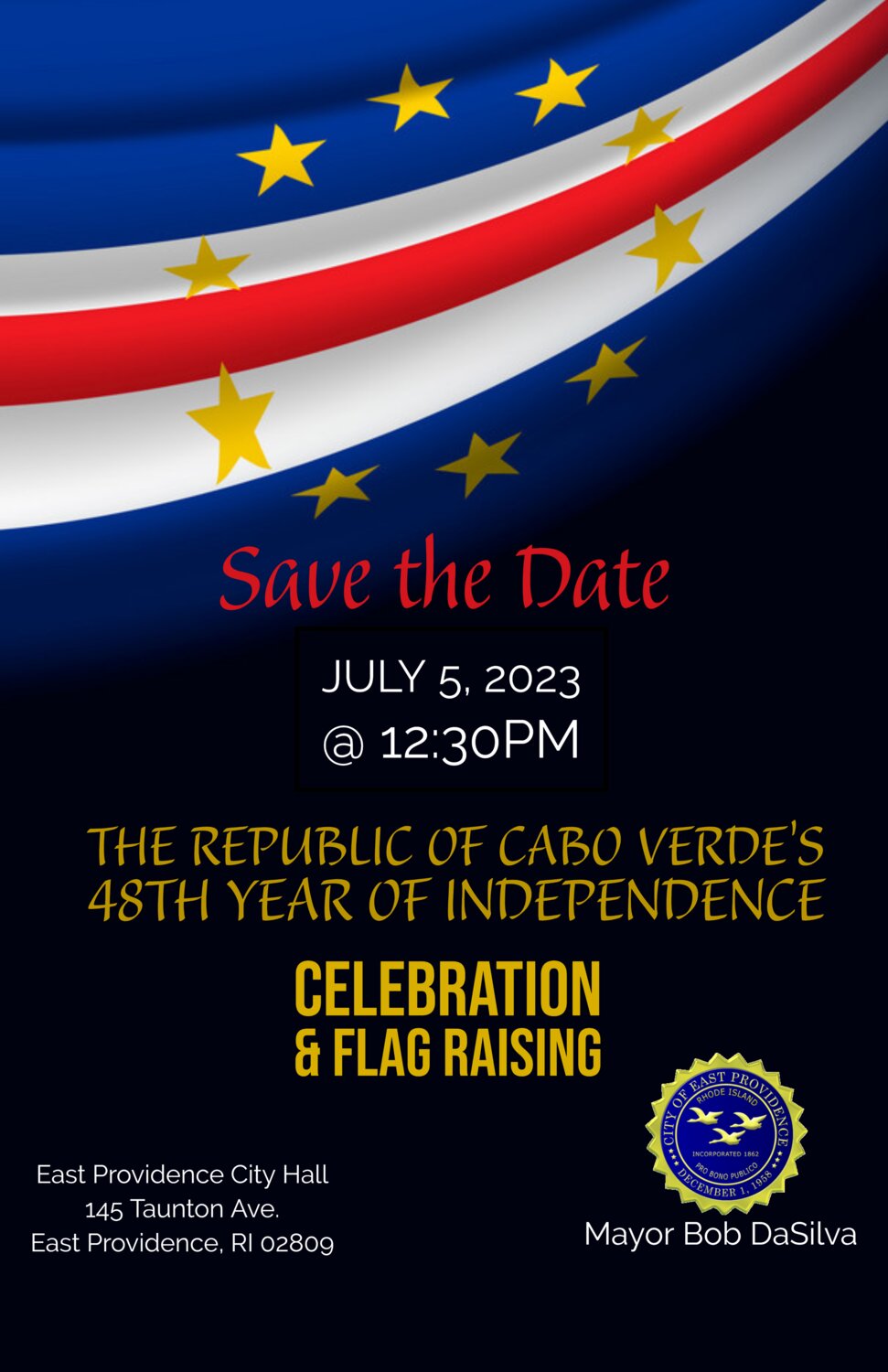The City of East Providence Celebrates The Republic of Cabo Verde’s 48th Year of Independence
Wednesday, July 5, 2023 |12:30 p.m.
East Providence City Hall
145 Taunton Avenue
East Providence, RI 02914
Program Coordinators
Ms. Djini Tavares
Mr. Elmer Carvalho Pina
A Special Thank You…
Honorable Mayor, Mr. Roberto L. DaSilva
City of East Providence
United States Senator, Mr. Jack Reed
Lieutenant Governor, Mrs. Sabina Matos
Secretary of State, Mr. Gregg Amore
Rhode Island State Treasurer, Mr. James Diossa
Rhode Island Senator, Mr. Robert Britto
The East Providence City Council
The East Providence Honor Guard
The Cape Verdean Museum
“The colonists usually say that it was they who brought us into history: today we show that this is not so. They made us leave history, our history, to follow them, right at the back, to follow the progress of their history.”
― Amilcar Cabral
FLAG RAISING OPENING
ABERTURA DO HASTEAR DA BANDEIRA
WELCOME | BOAS VINDAS
Mr. Elmer C. Pina – City of East Providence
Municipal Integrity Officer
Honorable Mayor, Mr. Roberto L. DaSilva
City of East Providence
United States Senator, Mr. Jack Reed
Lieutenant Governor, Mrs. Sabina Matos
Secretary of State, Mr. Gregg Amore
Rhode Island State Treasurer, Mr. James Diossa
Rhode Island Senator, Mr. Robert Britto
GUEST SPEAKER | ORADOR CONVIDADO
Ms. Charlene D’Sao Nicoleau
Mrs. Anna Marie Cabral
Mr. Elmer C. Pina – City of East Providence
Municipal Integrity Officer
NATIONAL ANTHEMS | HINOS
United States - Ms. Amara Pina
Cape Verdean - Mrs. Sandra Bell
RAISING OF THE CAPE VERDEAN FLAG
CLOSING | ENCERRAMENTO
Amílcar Lopes Cabral, (born September 12, 1924, Bafatá, Portuguese Guinea [now Guinea-Bissau]—died January 20, 1973, Conakry, Guinea), agronomist, nationalist leader, and founder and secretary-general of the African Party for the Independence of Guinea and Cape Verde (Partido Africano da Independência da Guiné e Cabo Verde; PAIGC), who helped lead Guinea-Bissau to independence. He was a leading African thinker of the 20th century.
After receiving his early education in Cape Verde, Cabral pursued university studies in Lisbon, where he helped to found the Centro de Estudos Africanos, an association of Lusophone African students that included future Angolan president Agostinho Neto. While in Lisbon, Cabral and some of his fellow African students developed political theories regarding colonialism and liberation. After graduating in 1950, Cabral was employed by the Portuguese colonial authorities as an agronomist. In the early 1950s he traveled widely in Portuguese Guinea in order to conduct a survey of the land and its resources, which provided him with the opportunity to interact with people from various cultures who lived in the colony.
During that time Cabral also continued to contemplate national liberation for colonies in Africa. In September 1956 he and five associates—including a brother, Luís, and Aristides Pereira—formed the PAIGC, and in December of that year he cofounded a liberation movement in Angola with Neto.
Cabral rapidly emerged as the leader of the PAIGC. The group organized early political resistance to colonial power in the form of workers’ strikes—calling for better wages and improved conditions.
However, the Pidjiguiti Massacre in August 1959, when the Portuguese fired on demonstrators during a dockworkers’ strike, demonstrated to the PAIGC that a different approach was needed. Resistance activity was subsequently shifted to the countryside and was altered to make use of guerrilla-style tactics.

















Comments
No comments on this item Please log in to comment by clicking here